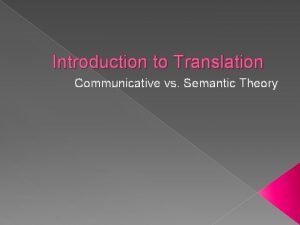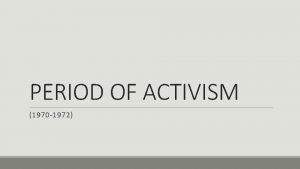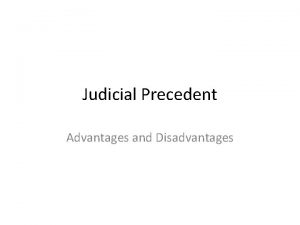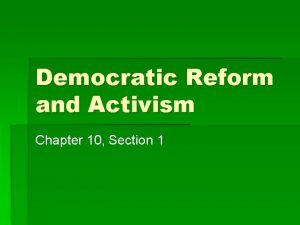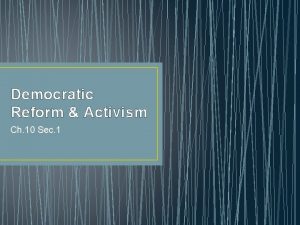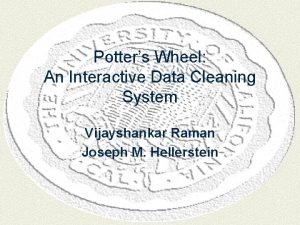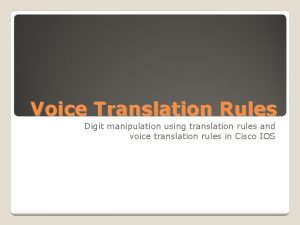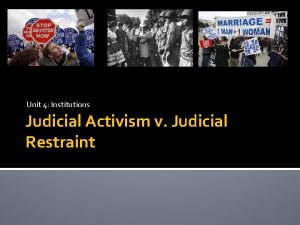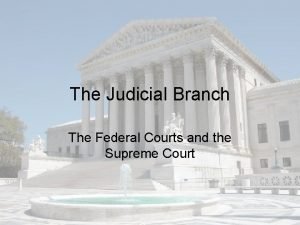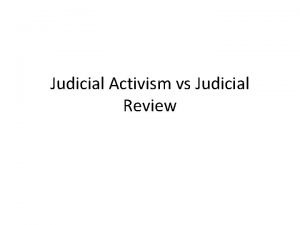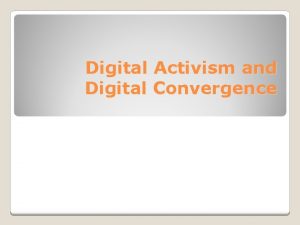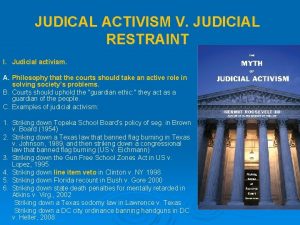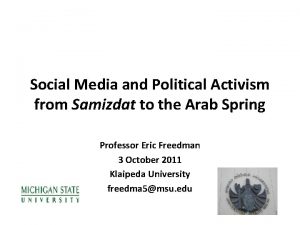Translation as a political tool Translation and activism











- Slides: 11

Translation as a political tool Translation and activism 1. Translation and activism 2. Thinking about the readings 3. Discussion

Translation and activism Alone, please consider the following questions: How would you define “activism”? What sorts of activities would an “activist” translator engage in?

Translation and activism Tymoczko (2006): Texts must be chosen for translation with political goals in view, and, if need be, there must be a willingness to manipulate the texts in translation, so as to adapt and subordinate the texts to political aims and agenda. The intent to transmit texts closely, in and for themselves, must in many cases—perhaps even most—be abandoned. (41 -42) Do you agree this is a key criteria of politically engaged translators?

Translation and activism With a partner, please discuss the following: Is activism by translators a new phenomenon, or is it an established practice that scholars have only recently turned their attention to? Can you think of examples from your own language pairs to support your view?

Translation and activism With a groups of 2 -3, read the mission statements/charters of the various activist translator groups. What similarities do these texts share? Do the goals of these groups raise ethical questions? How do these goals differ from those of professional translator associations like ATIO?

Thinking critically about the readings With a partner, take a look at Mona Baker’s article: What do you think of coherence and fidelity as methods for assessing the reliability of narratives? What advantage(s) does this approach offer? What are its limitations?

Thinking critically about the readings In groups of 3 -4, take a look at Maria Tymoczko’s article. What advice about designing/adopting/adapting theoretical frameworks can you draw out of her article?

Discussion related to the readings Questions from your classmates: If the Internet allows anyone to practice their ideology through translation, what will happen if the number of translated texts multiplies exponentially, making it too difficult to differentiate between legitimate and illegitimate sources?

Follow-up discussion questions Thinking about definitions: Tymoczko poses the following questions about Venuti: How does the passage of time affect the quality of resistance? Once resistant, always resistant? Or is resistance related to the specific historic and cultural moment of a translation? And if the latter is true, what criteria of interface with the cultural context determine resistance? Can we fault translations of the past for not being sufficiently resistant? (2000: 38) To what extent are these questions applicable to other concepts as well? How could we design a framework that would respond to these kinds of questions?

Follow-up discussion questions Baker argues that the activist groups she has cited: do not simply come together on the basis of national or other such static affiliations, nor are they motivated by personal ambition or profit. These are communities created by "election", to use Fisher's term. Translators and interpreters come together in these groups willingly to volunteer their time, to invest emotionally and intellectually in projects designed to undermine dominant discourses, and to elaborate more equitable and peaceful narratives of the future (2007: 474). Do you agree that all members of these activist groups are translating solely for the reasons Baker suggests?

References Baker, Mona. (2006). Translation and Activism: Emerging Patterns of Narrative Community. The Massachusetts Review 47(3): 462 -484. Ghosh, Rishab Aiyer (2005) ‘Understanding Free Software Developers: Findings from the FLOSS Study’, in Joseph Feller, Brian Fitzgerald, Scott A. Hissam and Karim R. Lakhani (eds) Perspectives on Free and Open Source Software, Cambridge, Massachusetts: MIT Press, 23 -46. Lakhani, Karim R. and Robert G. Wolf (2005) ‘Why Hackers Do What They Do: Understanding Motivation and Effort in Free/Open Source Software Projects’, in Joseph Feller, Brian Fitzgerald, Scott A. Hissam and Karim R. Lakhani (eds) Perspectives on Free and Open Source Software, Cambridge, Massachusetts: MIT Press, 3 -22. Tymoczko, Maria. (2006). Ethics, Ideology, Action. The Massachusetts Review 47(3): 442 -461. Tymoczko, Maria. (2000). Translation and Political Engagement: Activism, Social Change and the Role of Translation in Geopolitical Shifts. The Translator 6(1), 23 -47.
 Communicative meaning in semantics
Communicative meaning in semantics Parent functions
Parent functions Period of activism and new society
Period of activism and new society Advantages and disadvantages of precedent
Advantages and disadvantages of precedent Democratic reform and activism
Democratic reform and activism Chapter 10 section 1 democratic reform and activism
Chapter 10 section 1 democratic reform and activism Potter's tool is data cleaning tool
Potter's tool is data cleaning tool Voice translation rules
Voice translation rules Semantic translation và communicative translation
Semantic translation và communicative translation Judicial activism examples
Judicial activism examples Judicial restraint
Judicial restraint Judicial activism vs restraint
Judicial activism vs restraint
